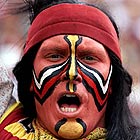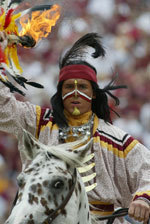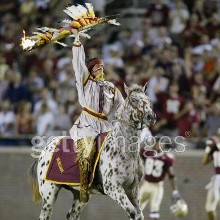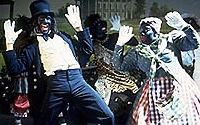 A response to Why FSU's Seminoles Aren't Okay:
A response to Why FSU's Seminoles Aren't Okay: A response to Why FSU's Seminoles Aren't Okay:
A response to Why FSU's Seminoles Aren't Okay:
In mid-August someone named Earl Watt wrote a column for a small newspaper denouncing the NCAA decision to ban Indian mascots from postseason tournaments. The title of Watt's column, "Schools, not NCAA, Should Decide," tells you all you need to know about his position. In response, I wrote Watt the following letter on 8/17/05:
Earl,
In the Fighting Sioux and the Fighting Illini cases, Indian tribes have already decided the issue. They're almost unanimously opposed to these schools' mascots. So why haven't the schools listened to their objections and changed?
In these cases, the Indians have said the so-called honor is something they want no part of. The NCAA has taken the Indians' side. Who says these schools are right to keep offending people and the NCAA is wrong to stop them?
For more on the so-called honor, see Smashing People: The 'Honor' of Being an Athlete.
Rob Schmidt
Publisher
PEACE PARTY

Watt responds (8/18/05)
We, each of us, are offended every day. From all the options on television, music, and personal preference, we each feel some sort of offense by those around us.
What we can do is decide whether or not to buy or watch or support the things we prefer versus the things we do not.
If a Native American or any other American doesn't like these mascots, she shouldn't support them. But the simple fact of being offended has no Constitutional merit. As a matter of fact, freedom of speech extends to offensive language as language that does not offend need not be protected. Offense alone has no merit. If that were the case, the only allowable color of hair would be blonde and eye color would be blue. The offense has to provide measurable damage. For most, seeing a Native American as a symbol for a team is a point of pride, both for many Native Americans and others.
To experience a free society, we have to, each one of us, accept trespass to preserve tolerance. Some Native Americans don't have to like the mascots or the names, but just because they don't like them doesn't give them an innate right to remove the name. We have a Constitution, and there has to be a violation of the Constitutional rights. This should be handled in a court of law, and not in the offices of the NCAA. This is a democracy, and the courts should determine the legality of a mascot. If Native maericans win in court and can prove Constitutional grounds for their case, then, and only then, should the names be changed. The NCAA didn't remove the names, either, they simply said those schools would not be allowed to host post-season tournaments.
If these tribes have a problem with the names, they should take the schools to court. That was the premise of my column. The NCAA has no authority in determining a chool's mascot. And you failed to mention that the Seminoles have fought to remove the NCAA sanction on Florida State. Apparently, not all Native Americans agree with the "representatives" who speak for them. The final line of the Seminoles' response in challenging the sanctions stated, "Once again, the White Man is trying to determine what is right for the Seminoles."
Earl Watt


Rob's reply (9/20/05)
Keeping in mind that Watt is black, I wrote the following reply:
Earl,
A belated response to your missive on Indian mascots:
>> We, each of us, are offended every day. From all the options on television, music, and personal preference, we each feel some sort of offense by those around us. <<
Yes. Black people were offended by being property, women were offended by not having equal rights, etc. All these situations were legal at the time these people felt offended.
>> What we can do is decide whether or not to buy or watch or support the things we prefer versus the things we do not. <<
That's one thing we can do. Another thing we can do is take collective action to right the wrongs that offend large numbers of people. This is why we live in a society that makes rules and regulations: to prevent things we collectively consider wrong.
>> If a Native American or any other American doesn't like these mascots, she shouldn't support them. But the simple fact of being offended has no Constitutional merit. <<
The NCAA isn't a legislative body, so your point is irrelevant. It was formulating rules for its members, not laws for society at large. If FSU or another university didn't like the NCAA's rules, it was free to appeal (as it did) or quit the organization.
>> As a matter of fact, freedom of speech extends to offensive language as language that does not offend need not be protected. Offense alone has no merit. <<
The First Amendment applies to the control of speech by government, not by a voluntary association of institutions. Your legal argument is the only thing lacking merit here.
>> If that were the case, the only allowable color of hair would be blonde and eye color would be blue. The offense has to provide measurable damage. <<
Wrong. Even assuming this is a legal issue, which it isn't, many such issues are decided on subjective grounds. You can't prove someone is harmed psychologically by acts of discrimination or harassment in the workplace, for instance. The only harm is what the person feels in that situation.
Court decisions are routinely based on what the "average" person would do or feel in the same situation. If you had been stereotyped as fierce, savage, and warlike for centuries, you might agree with the average Native person on the subject. Jurors wouldn't have to measure the damage; they'd only have to compare your feelings to the average Native's feelings.
>> For most, seeing a Native American as a symbol for a team is a point of pride, both for many Native Americans and others. <<
What "others" feel about the harm produced by Indian mascots is irrelevant, since they're not the ones affected. Besides, pundits have refuted the "pride and honor" argument long ago. See Smashing People: The 'Honor' of Being an Athlete for one such refutation.
As for how Natives feel, that's what's relevant. The list of Indian tribes, organizations, and individuals who oppose mascots is long and persuasive. See The Many Voices of Opposition for details.
>> To experience a free society, we have to, each one of us, accept trespass to preserve tolerance. <<
I'm sure Confederate plantation owners used the same argument to preserve their slaveholding privileges.
We have to accept "trespass" if we can't change it by democratic means. But Natives have worked through the system to convince bodies such as the NCAA to change their rules.
>> Some Native Americans don't have to like the mascots or the names, but just because they don't like them doesn't give them an innate right to remove the name. <<
No one said they had an innate right. They're winning their caseósome 1,800 of 3,000 schools have changed their names so faróbecause it's intellectually and morally superior, not because it's innately right.
Mascot lovers don't have to like the NCAA's decision, but they don't have an innate right to keep their mascots. If they can't win the argument by working through the system, as Natives are doing, they deserve to lose.
>> This should be handled in a court of law, and not in the offices of the NCAA. <<
Mascot foes are handling the Washington Redskins case in a court of law, since the name violates the trademark law against granting protection to offensive words.
>> This is a democracy, and the courts should determine the legality of a mascot. <<
Wrong again. The NCAA is free to establish whatever rules it wants for its members, and its members are free to abide by the rules, protest them, or get out.
>> If Native maericans win in court and can prove Constitutional grounds for their case, then, and only then, should the names be changed. <<
Nope. I hope your understanding of the mascot issue isn't based on your claim that it's a constitutional issue. Because it isn't.
>> The NCAA didn't remove the names, either, they simply said those schools would not be allowed to host post-season tournaments. <<
Yes, I know.
>> If these tribes have a problem with the names, they should take the schools to court. That was the premise of my column. <<
Why should they? Because you incorrectly consider it a legal issue, not an issue of self-regulation?
>> The NCAA has no authority in determining a chool's mascot. <<
The NCAA has the authority to do what it did: penalize schools with problematical mascots. As you say, it didn't ban the mascots, it merely said schools couldn't use such mascots if they wanted to participate in the NCAA's post-season tournaments. The NCAA certainly has the power to determine how to run its own operations.
>> And you failed to mention that the Seminoles have fought to remove the NCAA sanction on Florida State. <<
I've mentioned that many times in my postings and letters to the editor. See Why FSU's Seminoles Aren't Okay for my response to the point.
>> Apparently, not all Native Americans agree with the "representatives" who speak for them. <<
No, they don't all agree with the NCAA's decision. But many of them do.
>> The final line of the Seminoles' response in challenging the sanctions stated, "Once again, the White Man is trying to determine what is right for the Seminoles." <<
A great sound bite, but a false summation of the issue. The NCAA didn't determine a policy by ignoring Native opinion, it determined one by reflecting Native opinion. Here are the facts that the NCAA was aware of, even if most columnists weren't:
The Seminole Nation of Florida supports the Seminole name. I believe one or two unrecognized Seminole bands in Florida oppose the name. The much larger nation of Oklahoma Seminoles voted not to oppose the nameói.e., to remain neutral. As members of the Intertribal Council of the Five Civilized Tribes, the Oklahoma Seminoles are on record opposing all mascots. The National Congress of American Indians, which includes the Seminole tribes, is on record opposing all mascots. Verdict: Inconclusive at best.
Documentation: The Five Civilized Tribes Intertribal Council Mascot Resolution
You're the one who hasn't addressed the almost universal Native opposition to the Fighting Sioux and Fighting Illini names. So feel free to address the point. When the opposition is clear and compelling, what's your excuse for keeping these names?
Rob Schmidt
Publisher
PEACE PARTY
|
. . . |

|
All material © copyright its original owners, except where noted.
Original text and pictures © copyright 2007 by Robert Schmidt.
Copyrighted material is posted under the Fair Use provision of the Copyright Act,
which allows copying for nonprofit educational uses including criticism and commentary.
Comments sent to the publisher become the property of Blue Corn Comics
and may be used in other postings without permission.